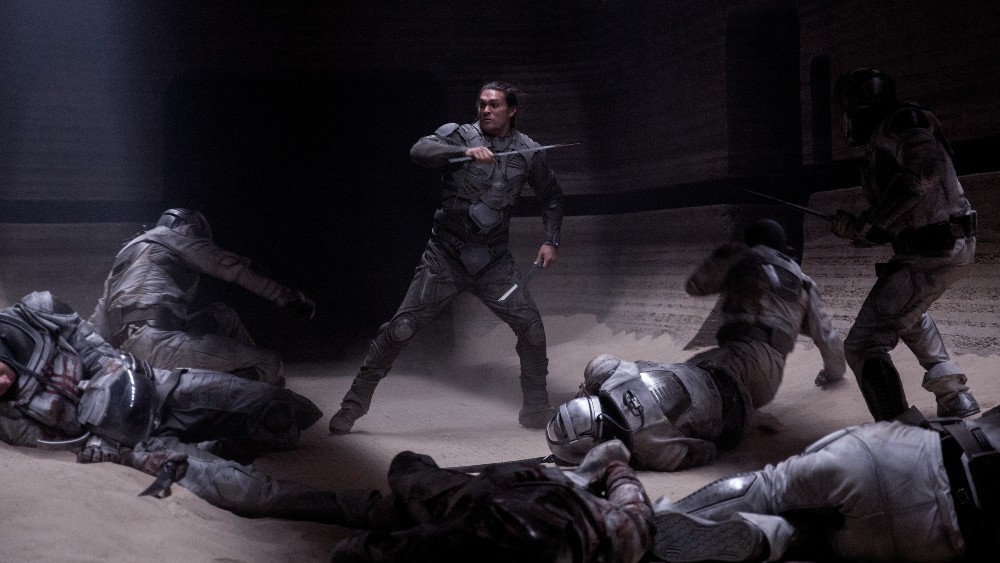
There has to be some level of anticipation and expectations when it comes to Denis Villeneuve’s Dune, not only because it’s the French-Canadian filmmaker’s first movie since Blade Runner 2049, and not just because it was delayed by a year, but also because it’s a much-read and in some circles beloved sci-fi classic by author Frank Herbert. Also, there was a famed and nearly-disastrous David Lynch adaptation from 1984 from which only a few fans of Herbert’s book ever recovered.
To be fair, Lynch probably knew that Herbert’s work was going to be a difficult and expensive prospect, and one would imagine that Villeneuve was aware of that, as well. (If you’ve seen the doc, Jodorowsky’s Dune, then you also know that the Chilean cult movie auteur Alejandro Jodorowsky also gave it a try.) But let’s put aside any confusion that Dune might be a remake of any kind, since Villeneuve clearly went back to the original source material for his version.
There’s no real way to simplify the story, because Herbert’s novel was a great example of early sci-fi world-building. Essentially, it takes place amidst a war between three factions for the planet Arrakis, which offers a valuable spice that offers healing powers and life extension. House Atreides is led by the Duke (Oscar Isaac) with his son Paul (Timothée Chalamet) being taught how to use his inherited powers of “The Voice” from his mother (Rebecca Ferguson). Atreides has just made an accord with the natives of Arrakis, the Fremen, and have arrived to live there, but the malevolent House Harkonnen is not going to give up their access to their spice so easily, and therein lies the conflict. Paul also has dreams about a mysterious beauty (Zendaya), and oh yeah, he might be the prophesied Messiah of Arrakis.

If elements feel familiar, it’s good to remember that Herbert wrote the original novel in 1965, years before Arthur C. Clarke and Stanley Kubrick’s 2001: A Space Odyssey, and also before we even put a human on another planet. That also means it was before any Star Wars, any Mad Max movies, and well before Keanu Reeves’ Neo was declared to be “The One” in 1999’s The Matrix. In other words, Herbert’s novels have been and continue to be hugely influential on anyone who has ever written the words “science fiction” on a piece of paper or word processor.
Dune also takes place within a world that involves so many foreign words and usage one almost needs a glossary going into it in order to not be immediately lost within the first hour, which essentially just sets things up. Things pick up midway when Paul and his father go out to investigate the spice mining on Arrakis, only to witness one of the planet’s enormous sandworms bearing down on a spice harvester, requiring them to step in for a rescue.
As you might expect, Villeneuve uses the same broad painterly strokes as he brought to his sequel Blade Runner 2049 a few years back, in order to create the largest landscape and tapestry for his characters possible, although that doesn’t mean he bothered using much of a palette since the entire film looks rather drab and monochromatic.

That’s not to discount the work of the director’s go-to Production Designer Patrice Vermette, whose contributions to the film’s design involves a lot more than a world made up of sand dunes, whether it’s the horsefly-shaped ships or the even larger locations that we often see only briefly. A lot of credit for the more fantastical elements must be given to the visual effects team under VFX Supe Paul Lambert. The costume work by Costume Designers Jacqueline West and Robert Morgan is quite exceptional, as they’ve given quite a wide spectrum of outfits for the characters, whether it’s for leisure, fighting, or surviving in Arrakis’ harsh landscapes.
While Cinematographer Greig Fraser ASC, ACS is able to capture the epic scale of Villeneuve’s vision, the lack of color ends up being a major hindrance, and there similarly doesn’t seem to be much differentiation between the lighting of interiors and exteriors.
Maybe the one craft or crafts that really stands out, possibly more than any other aspect of the movie, is Hans Zimmer’s bombastic score that’s given far more room to deliver the power he’s able to bring to this sort of big-screen experience. As much as I love this score and feel like it’s one of the year’s best, I feel bad for Johnny Greenwood, who has at least two (maybe three) amazing scores that may have finally gotten him an Oscar, and along comes previous winner, Zimmer, to steal away those chances. Likewise, the sound work by Supervising Sound Editors Mark Mangini and Theo Green, Re-Recording Mixer Doug Hemphil, and Recording mixer Ron Bartlett — all returning from their Oscar-nominated work on Blade Runner 2049 — is quite worthy, although sometimes you may wonder if the sound is good because it’s loud, or if it’s just loud. (Sadly, I didn’t get to see the movie in IMAX or Dolby, which likely would have enhanced the sound even more, as well as the size and scope of the entire film.)
As gorgeous as Dune looks, almost all the performances are generally emotionless and not particularly nuanced other than maybe Stellan Skarsgard’s delightful Baron Harkonnen. Villeneuve has managed to amass another great cast, but it seems like many of them have little to do but recite lines, other than those who actually get a chance to fight. Zendaya barely has a chance to appear in the movie despite her character narrating the opening. But even the fights seem like glorified lightsaber battles with the addition of everyone having security shields, which rarely do their job of protecting the wearer.

While there are some fantastic set pieces and action moments during the middle hour of Dune, it ends with a downturned third act where Paul and his mother are wandering across Arrakis, stranded until they encounter a group of Fremen, including a leader played by Javier Bardem.
Dune is a movie that lacks emotion but also lacks much in the way of tension, and after 2 ½ hours, the movie just ends with the equivalent of a “To Be Continued…” — to be fair, the opening title literally says “Dune Part 1” — but some may find that a little disappointing, especially since a 2nd part hasn’t actually been greenlit by the studio yet.
Dune is roughly half a good movie, but that’s only because it really is only half a movie. In some ways, it got me more excited about going back and reading some of Herbert’s novels, rather than waiting to see if this does well enough to indeed warrant its necessary conclusion. How much will Dune have to make to warrant that sequel, and is Warner Media hoping that the movie will get their streamer HBO Max enough new subscriptions to warrant another movie, especially when this one looks so expensive? Only time will tell, but hopefully, Villeneuve will use a second film’s runtime in a way that offers more in the form of entertainment for the Herbert novitiates?
Rating: 6/10
Dune is currently playing in overseas markets, but it will open in North America in regular and premium (i.e. IMAX, RPX, Dolby) theaters starting Oct. 22. It will also be on HBO Max. It recently had its United States premiere at the 59th New York Film Festival.
All pictures courtesy of Warner Bros. Pictures.





